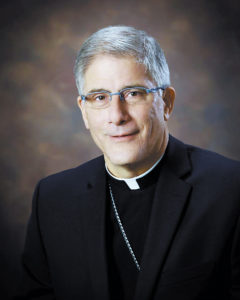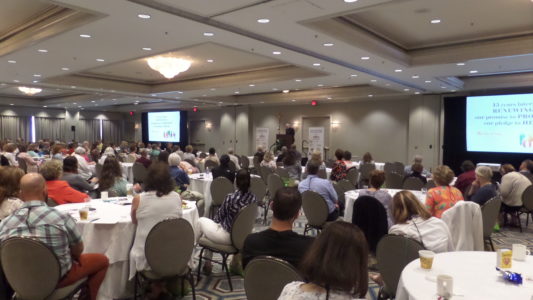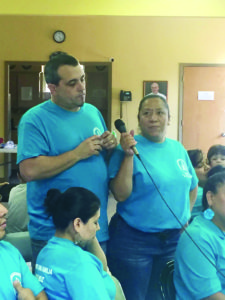SPIRITUAL ENRICHMENT
CHATAWA St. Mary of the Pines Retreat Center, Icon workshop/retreat for students who are beginners in iconography, August 20-27. They will be led by Father Igumen Mefodii from the Prosopon School of Iconography. Suggested donation: $1,145. Details: Sister Sue Von Bank (601) 783-0801 retreatcenter@ssndcp.org.
FORT SMITH, Ark, St. Scholastica Monastery, July 19 – 22, Standing in the Presence: the Benedictine way for everyone. Presenter: Sister Macrina Wiederkehr, OSB. The focus will be Benedictine spirituality as a pathway for spiritual growth. Cost: $300. Lodging and meals are included. Deadline for registration is July 5. Details: retreats@stscho.org or www.stscho.org/retreats or (479) 783-1135.
GREENWOOD Locus Benedictus Spirituality Center, The Redemptorist priests of Greenwood are now available at the retreat center on Tuesdays and Thursdays from 1-4 p.m. for spiritual direction, the Sacrament of Reconciliation and prayer. Details: (662) 451-7980.
HOLLY SPRINGS, “Hands-ON + Hearts-IN” provides week-long discernment experiences for women who are considering life as a Catholic Sister on the following dates: August 22-25 and September 10-14. The only cost to attend is the travel to and from the workshop and travel assistance can be provided. Jointly hosted by the Sisters of the Living Word, the Chicago Archdiocesan Vocation Association and Sacred Heart Southern Missions. Applicants must register one full month prior to the start of a specific program. Details: Sister Sharon Glumb, SLW, (847)-577-5972 ext. 233 (office), (601) 291-6738 (cell) or sglumb@slw.org.
PARISH, SCHOOL AND FAMILY EVENTS
AMORY St. Helen, Book Discussion on To Say Nothing of the Dog by Connie Willis, Monday, July 9, at noon in the parish hall. Details: (662) 256-8392.
CLARKSDALE St. Elizabeth, college/young adult Bible study meets Wednesdays at 6 p.m. and will be discussing popular questions about Catholicism. Details: Sarah Cauthen at the church office (662) 624-4301 or (662) 645-6260
GLUCKSTADT St. Joseph, “Extending Our Reverence” – Christian Yoga Workshop, begins Tuesday, July 10 at 6 p.m. in the parish hall. It is a four-week workshop and will focus on breathing, movement, body alignment and meditation with Lectio Divina. The workshop is limited to 10 spaces and is being taught by Teresa Speer. Cost: $20 donation. Sign-up sheets are on the table in the church foyer. Details: (601) 856-2054.
NATCHEZ St. Mary Basilica, Parish Blood Drive in the O’Connor Family Life Center, Tuesday, July 31, 12:30 – 6 p.m. Details: (601) 445-5616.
Choral Concert, Wednesday, July 18 at 7 p.m. Free admission and open to the public. Guest Conductor: Dr. Rollo Dilworth. Details: (601) 445-5616.
YAZOO CITY St. Mary, Parish Potluck Lunch, Sunday, July 15 after 10:30 a.m. Mass in the Parish Hall cafeteria. The church will provide the meat, bread and drinks. Parishioners’ last names A-D, please bring a salad, E-H, please bring a meat or vegetable casserole, I-Q, please bring a vegetable, R-Z, please bring a dessert. Details: (662) 746-1680.
YOUTH BRIEFS
AMORY St. Helen, Vacation Bible School, July 22-24, 5-8 p.m., with a closing cookout at 6 on Wednesday, July 25. This year VBS for St. Helen and First Presbyterian children will be held at First Presbyterian Church. Details: (662) 256-8392.
MADISON St. Joseph School Gym, Bruin Cheer Camp, July 16-20, 9 a.m. – noon for rising K-6th graders. Cost: $150. Details: Coach Racheal Cole at rbcole1225@gmail.com.
NATCHEZ St. Mary Basilica, Summer Choir Camp, July 16-20, 9-11:30 a.m. Let your child learn the joy of song in the context of children’s choir. Students also will complete a visual arts project and serve as music ministers for the 5 p.m. Vigil Mass on Saturday, July 21. Details: Register online at www.stmarybasilica.org or email Musicdirector@cableone.net.






 TUPELO – Lupe y Steve, una de las 12 parejas del Movimiento Familiar Cristiano (MFCC) en Tupelo, dan su testimonio sobre los logros que han alcanzado en el grupo. Durante la última reunión del año todas las parejas recibieron un diploma y dieron su testimonio. Lupe dijo que ella y su esposo se han beneficiado mucho con las charlas y reuniones, notando que han mejorado mucho la comunicación entre ellos dos. “Ahora hablamos más sobre nuestras cosas”, dijo. Steve no es católico, dijo Lupe, pero va a la iglesia con ella y siempre hace una oración antes de comer, aún en lugares públicos. “Y, primeramente Dios este año va comenzar a tomar las clases para ser católico, y añadió que en agosto van a empezar a invitar a otras parejas a que se unan a “esta gran familia que es el Movimiento Familiar Cristiano para que ellos también hagan un cambio en sus vidas y para que aprenda un poco más de nuestro padre Dios.”
TUPELO – Lupe y Steve, una de las 12 parejas del Movimiento Familiar Cristiano (MFCC) en Tupelo, dan su testimonio sobre los logros que han alcanzado en el grupo. Durante la última reunión del año todas las parejas recibieron un diploma y dieron su testimonio. Lupe dijo que ella y su esposo se han beneficiado mucho con las charlas y reuniones, notando que han mejorado mucho la comunicación entre ellos dos. “Ahora hablamos más sobre nuestras cosas”, dijo. Steve no es católico, dijo Lupe, pero va a la iglesia con ella y siempre hace una oración antes de comer, aún en lugares públicos. “Y, primeramente Dios este año va comenzar a tomar las clases para ser católico, y añadió que en agosto van a empezar a invitar a otras parejas a que se unan a “esta gran familia que es el Movimiento Familiar Cristiano para que ellos también hagan un cambio en sus vidas y para que aprenda un poco más de nuestro padre Dios.”